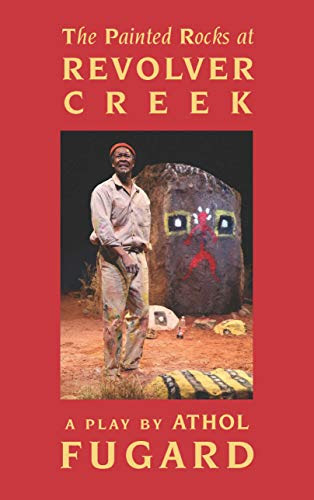

At 90, South African playwright Athol Fugard remains a vital and vibrant chronicler of the political, moral and spiritual damage wreaked in his country by apartheid. The system may have been banned in 1994, but its legacy continues, much the way America is grappling with the original sin of slavery.
“The Painted Rocks at Revolver Creek,” picks up on the work of remembering and reconciliation that has occupied Fugard since Nelson Mandela heroically altered the course of South Africa’s future. This, his last play, has a valedictory air to it — the sense of an artist dealing only with essentials. Storytelling and social justice, the twin themes of Fugard’s work, are wedded together in a two-act drama that is constructed to resemble a parable.
His inspiration comes from the story of real-life outsider artist Nukain Mabuza. The first act, which takes place in 1981, focuses on the interaction between Nukain, the artist behind the rocks, and young Bokkie, who is coaxing him into painting the last and largest boulder in the field. Carting around the paints and supplies, Bokkie urges “Tata” to work his magic with the brushes, but the weary old man is daunted by the task and urges Bokkie to paint for him, giving him instructions so that the story of his life can be figuratively represented.
Elmarie, the tough Afrikaner woman who owns the farm on which Nukain and Bokkie work, shows up and complains about Bokkie’s mischievous ways. She fears he might have a kernel of that troublemaking spirit of the new wave of black protesters causing havoc in Johannesburg.
The second act takes place in 2003, a decade after apartheid has been dismantled. Bokkie, grown up and using his proper name, Jonathan Sejake, returns to repaint Nukain’s story on the rock but is stopped by Elmarie, who instead of wearing a cross is donning a holster with a gun she has no qualms about whipping out. (That crucifix seems as deadly as her pistol.) Elmarie’s second-act conversation with Jonathan is the heart of the play, a collision of irreconcilable truths that must somehow be reconciled for the sake of a country both claim as their own.
It’s interesting how Artists in their late works often turn their lives into allegories. It just so happens that Fugard’s tale is also South Africa’s.
Come with us as our peripatetic Pandemic Players sojourn to the Transvaal!
Curtain going up at 3!
Meeting ID: 867 9293 7601
PW: WmhNbWhCMXJHNTNnUGI5VWYwNHFjUT09